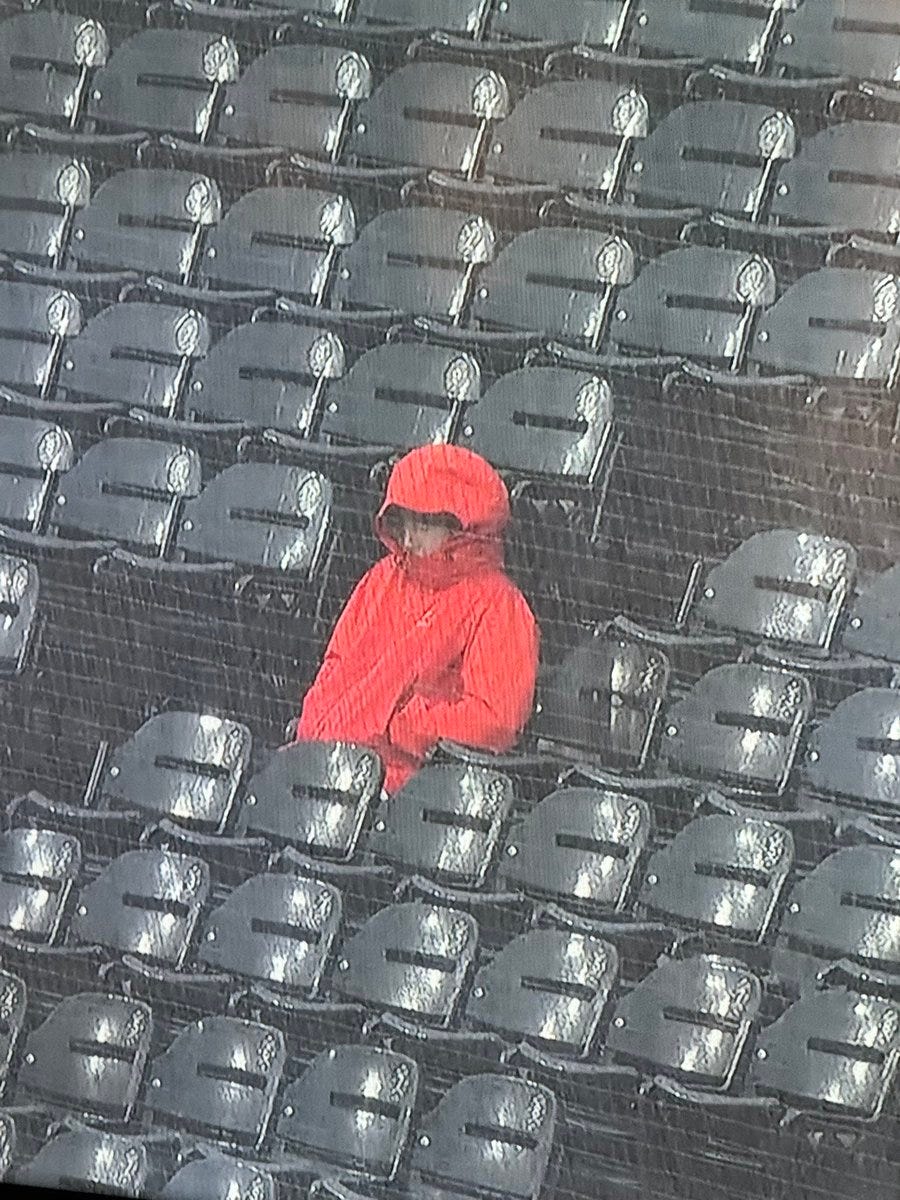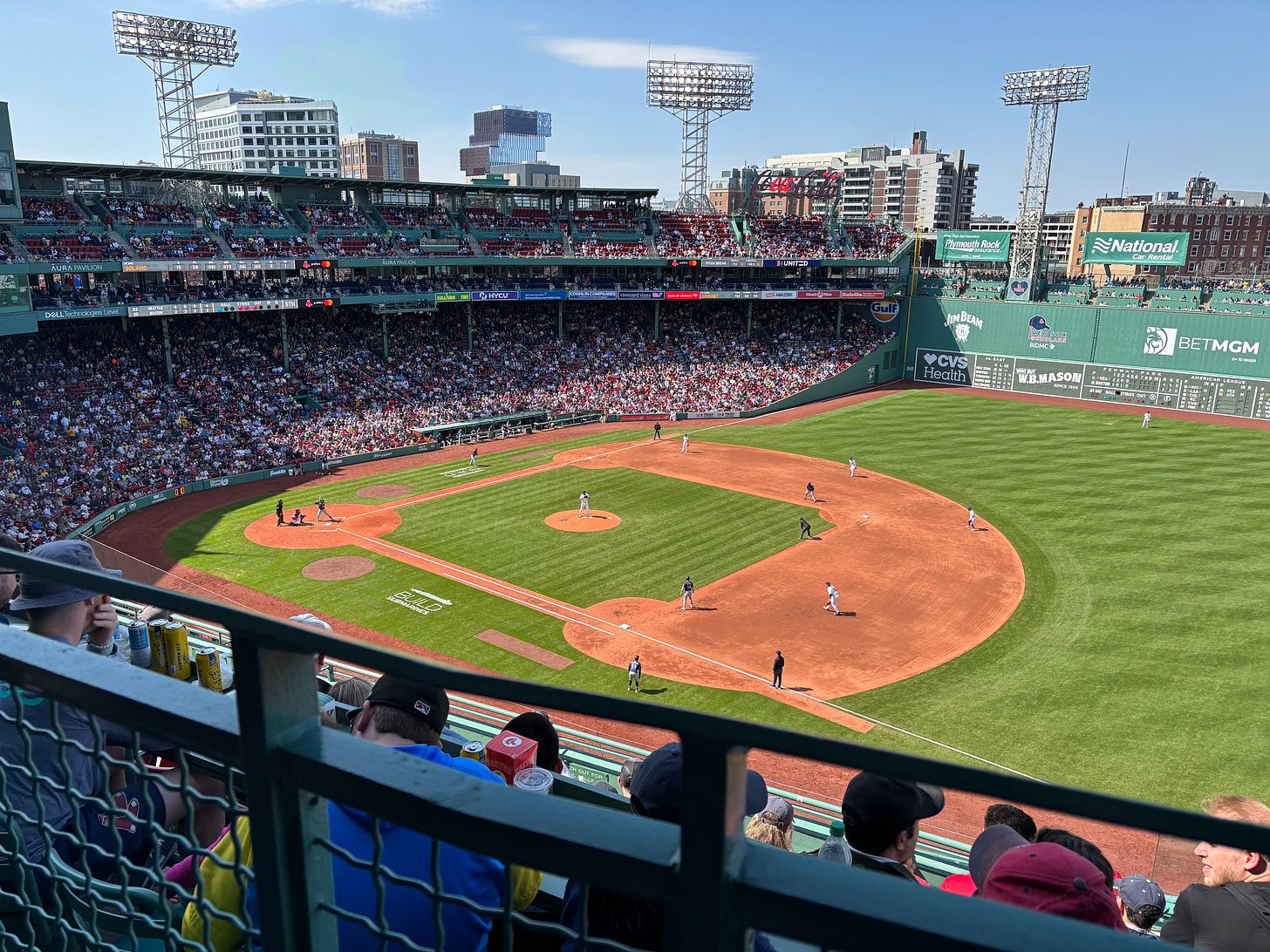True Grit
The documentary that explains why, despite decades of objective failure, a certain kind of sports fan just can't quit the Mariners
Note: if this is your first time reading The Enni Way, start here to understand my summer of going (strategically) insane about baseball.
April 24 - Mariners @ Red Sox (W, 4-3)
Remember how I said this summer is possible because I got a cheap ticket hookup? Well, it comes with a caveat: I’m on standby, so if they sell out and everyone shows up, I get shunted to another flight. That’s what happened on Wednesday, April 23. By the time I got to the city it was around 10 p.m. Starving, I found a bar whose kitchen was still open. I sat where I could swivel my head to catch either the Florida Panthers taking on the Tampa Bay Lightning in the first round of the Stanley Cup playoffs or the Golden State Warriors facing down the Houston Rockets in the NBA Finals.
Eventually, a young woman sat down beside me and we started talking. She was beautiful, with dark hair and light brown eyes. She had a natural, chatty charm honed by years of tending bar to pay her way through college. That’s what brought her to Boston from her native New Jersey. When I mentioned why I was in town, her face lit up. She said she was a Mariners fan, too. And when I asked why, her answer was so perfect I wish I could’ve bottled it: Dorktown.
Dorktown is a sports documentary series by filmmakers, sports freaks, and medium-busting storytelling savants Jon Bois and Alex Rubenstein. They’ve covered things like the tragedy of the 2010 Chargers, one of the best football teams in history, missing the playoffs; Ricky Henderson’s soul-crushing base stealing efficiency; and what would have happened if Shaq had missed all 11,252 of his free throws. These were seven to 10-minute shorts on YouTube, well-researched deep dives on curious moments or trends. But in 2020 they debuted what would become a massive, viral hit: A six-part, nearly four-hour series on the history of the Seattle Mariners.1 Here’s how the Dorktown guys sold it: “The Seattle Mariners are eminently lovable, profoundly human, and outrageously weird. This is the story of the most fascinating sports team on Earth.”
They covered it all. From the team’s ignoble beginnings as the Seattle Pilots playing in Sick’s Stadium (where the plumbing only sometimes worked), to the peak of cool with Ken Griffey, Jr. and Ichiro, back to a long, painful stretch of mediocrity known as The Drought. They dove into stories like the haunting prank involving Jell-O in toilet bowls that gripped the city for an entire summer; how right fielder and buzz cut aficionado Jay Buhner once made the entire outfield barf at once; and that time our third baseman tried to huff and puff a ball over the foul line. Everything but a trip to the World Series because, again, the Mariners have never been. And the documentary does all this without exclusive player interviews or access to rare archival footage. The central visual is a blue calendar tracking all the years of the Mariners existence. The camera pans over superimposed graphics: newspaper headlines; pictures of Mariner greats; and colorful charts tracking all our statistical achievements (complementary and derogatory). It’s surreal, it’s funny, it sometimes made me feel motion sick. In other words, it’s the perfect way to tell the story of this team.
The Seattle Mariners aren’t good – or at least, the good times are far, far outweighed by the bad. But the preponderance of poor-to-mid baseball has created a bizarro world way out in America’s upper right shoulder, a place where men are or become strange, and hoo boy are there stories. Combine that with mid-to-malignant front office personnel whose mystifying organizational maneuvers define Hanlon’s Razor. As Graham MacAree, a Mariners fan and then editor-in-chief of SB Nation, the site that employs the Dorktown guys, explained: “Technically, the Mariners are a sports team. Admittedly, they’re a team that probably should never have existed, and is lucky to still exist, one that’s squandered more or less every good thing that’s ever happened to them in increasingly bizarre and upsetting ways.”
Bois and Rubenstein mine that cursed alchemy for existential thrill and despair. And they’re good at it; when the series debuted, the New York Times declared it one of the best episodes of television that year. For a certain kind of fan—someone bemused and delighted by outlier statistics and wacko subplots—that makes the team kind of irresistible. “The Mariners should not have any fans. None! Their default state, disguised by a seven-year blip, is rampant and frequently surreal futility,” MacAree wrote. “Yet the fans still exist, bound to this odyssey of a team by inexplicable, unbreakable ties.”
Like my new friend. She said she used to put the Dorktown series on in the background while she studied. She watched it many, many times as she made the grind through grad school. And she’s not alone. On May 20 of this year, the Mariners took on the White Sox in Chicago. The game was in a rain delay but a few stalwart fans remained in their seats, waiting out the storm. CHSN focused in on one, a young man in a bright red rain jacket.

The White Sox analyst said, “I’m worried about those kind of people. … I don’t like those kind of people. Lonely, sitting by themselves in the rain?”2 That was a Mariners fan, of course. Daniel Fabregas learned that he’d been singled out in the broadcast and tweeted at the Ms TV crew, who immediately went into the stands to hang out with him. They revisited Daniel mid-game and he explained that he’s from Chicago but was drawn to Seattle’s team because he loves weird stats. “I am a finance guy at heart, so I ask myself a lot of weird and obscure questions while watching Mariners games,” Daniel said. “YouTube documentary by Jon Bois, would highly recommend it if you haven’t seen it. It talks about all the statistical anomalies that the Mariners franchise presents and why, even if you don’t love baseball, you can at least appreciate what the Mariners stand for, at their best and at their worst.”
Bois once said, in an interview with Filmmaker magazine, “[F]rom the jump, we always engineer our projects for the enjoyment of people who never caught that chapter of history, or don’t watch football, or don’t even really watch sports in the first place.” Though Bois and Rubenstein don’t shy away from advanced stats and metrics, their project is an exploration of sports as a fundamentally human pursuit; one of the ways we try to define ourselves and create stories about our lives, to connect with and stand apart from the billions with whom we share this oh-so-brief blip of consciousness. That speaks to me, and to Daniel. And we’re not the only ones.
Back to my new friend at the bar. Once we discovered this common ground, we were flying. The sports connection worked its particular magic, and opened every other conversational door. Soon she was telling me about being hospitalized after a breakup. I was telling her about the regrets I have from my divorce. We helped one another fend off the one dude who was determined to touch every woman in the bar.
When it came time to part ways, we exchanged numbers. I texted her when I got to my hostel: Safe. So nice to meet you. If I wasn’t safe, she would not have known what to do or who to call. But that night she was a beacon in Boston’s greater darkness. Nice to meet you, too.
The next day, hungover, I went to beautiful Fenway Park. One of the central questions Dorktown asked about the Ms was: Will they always be like this? For that day, at least, the answer was no. The Mariners beat the Red Sox, 4-3, and sat on top of the American League West. I had to leave the game early to catch a red-eye… which was overbooked. I got bumped to a flight the following day. Oh well. As a Mariners fan, the one thing I know how to do is persevere.
⚾ 🔱
🗣️ This week on Scamfluencers, we interviewed Bridget Read, the New York Magazine investigative reporter whose new book, Little Bosses Everywhere: How the Pyramid Scheme Shaped America, is required reading about the ways multi-level marketing have created the hellscape we live in today, either implicitly (the Saratoga Springs water guy) and explicitly (Project 2025). Absolutely worth a listen.
📺 Related video pleasure: Rewind, another video series from the minds behind Dorktown, takes a deep dive into Marshawn Lynch’s Beastquake run
The doc debuted on March 26, 2020—which would have been opening day for the Ms, if it weren’t for all the COVID. Honestly, the fact that a documentary about our franchise, in the works for months and meant to coincide with a moment of hope, was delayed because a global plague shut down baseball for months… feels perfectly fitting.
You don’t like those kind of people? People with iron wills and true resilience? You don’t like people unafraid to be alone with their own thoughts, willing to brave the elements for no reason other than to map the outer limits of their own interiority? Have you ever been camping, sir? On an aimless midnight walk? Allowed yourself to feel despair? Grow the fuck up and get a real, actual life.






Great now I wanna fight an analyst